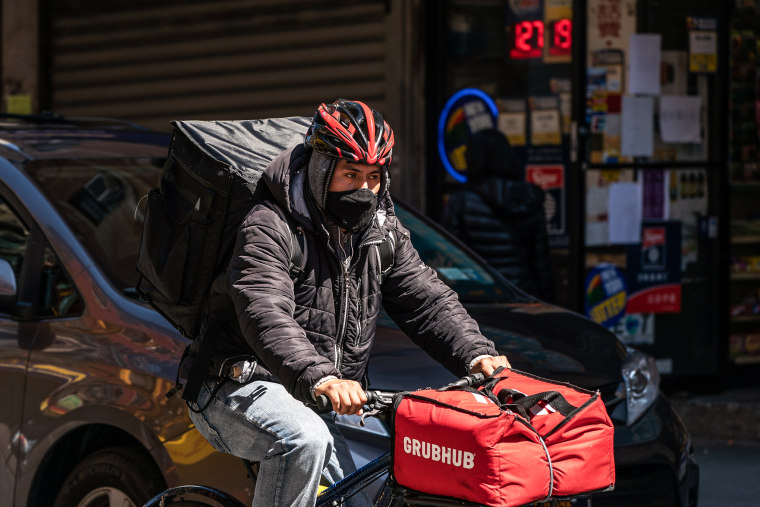New York City began mandating its first minimum wage for app-based delivery workers Monday, forcing a long-awaited shift in how popular platforms like Uber, Grubhub and DoorDash pay gig workers.
The city set a minimum rate of $19.96 per hour Sunday, with plans to fully implement the new standard by April 1, 2025. With some app-based delivery workers across the city relying primarily on tips to make their livings, earning an average of $7.09 per hour, advocates say the new rule is a step in the right direction.
“This is pretty much changing not only the course of history, but … guaranteeing and expanding protections for gig workers,” said Ligia Guallpa, the director of the New York-based Workers Justice Project, which helped lead the advocacy efforts for a minimum wage.
The mandate, which took effect Monday, will start at $17.96 per hour, increase to the standard by the 2025 deadline and adjust annually for inflation, the city said in a news release. As long as delivery apps pay workers the minimum rate on average, they have the option to pay per trip or per hour worked or to develop their own formulas.
Mayor Eric Adams said Sunday in announcing the measures that delivery workers have long been essential to the city’s health and safety, particularly during the pandemic.
“Those who I saw during the years of Covid, when people were able to shelter in place, the reason they were able to shelter in place is because these men and women were delivering food and services to them,” he said. “We had two New Yorks: Those who were able to stay home and those who created the environment so you were able to stay home, and we owe them a debt of gratitude. They delivered for us. Now we are delivering for them. It is the right thing to do, and we are proud of it.”
The announcement comes after years of advocacy from local community-based organizations and delivery workers. About 65,000 app-based delivery workers, often immigrants from South and East Asia, Latin America and Africa, work in the city. However, they’ve been considered independent contractors, excluded from labor protections and exempt from minimum wage requirements. While the city passed a package of protections for delivery workers in 2021, the Adams administration missed the deadline to implement it in January.
Recent discussions around delivery worker safety and pay were further highlighted because of Canadian wildfire smoke that blanketed much of the East Coast last week, causing the city’s air quality to be the worst in the world Wednesday, triggering advisories across all five boroughs. Many delivery workers had previously said they couldn’t afford to miss a day of work, especially because tips tend to be higher during inclement weather.
“If you’re out for long periods of time, you feel your breathing become more difficult. It starts to hurt,” a Brooklyn-based delivery worker who requested anonymity for fear of retaliation said in Mandarin through an NBC News translation. “It’s like cigarette smoke. The more you’re out, the more your throat hurts.”
A City Hall spokesperson said in response to an inquiry Wednesday that “the Adams administration is in the process of finalizing a rule that will ensure delivery workers are paid a fair rate.”
Sunday’s minimum wage announcement wasn’t well received by some apps, like DoorDash, which called the rule “misguided” and argued that it could result in fewer opportunities for its delivery workers, price more customers out of orders and affect jobs at local restaurants. A DoorDash spokesperson said in a statement that the company will “continue to explore all paths forward — including litigation.”
“Today’s deeply misguided decision by the DCWP ignores the unintended consequences it will cause and sadly will undermine the very delivery workers it seeks to support,” the spokesperson said, referring to the city’s Department of Consumer and Worker Protection. “We hope that we can find a path forward that allows us to continue to best serve the communities across New York City.”
The Workers Justice Project is leading an outreach campaign aimed to ensure delivery workers know their rights and are aware of the new minimum pay rate. Guallpa said much of her organization’s work will involve “making sure that we educate, organize and enforce this minimum pay rate.”
“We still need to fight for more protections, such as fighting the deactivation, wage theft … and also making sure that there is the right infrastructure for an industry to do this work and sustainable transportation,” Guallpa said.
Last year, Seattle passed similar legislation that has not gone into effect yet to pay delivery workers the city’s minimum wage and provide other benefits. In April, Mayor Bruce Harrell signed another law providing paid sick leave to gig workers at companies with more than 250 workers. That law went into effect last month.
